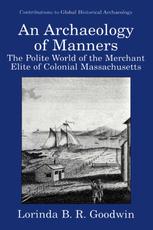

Most ebook files are in PDF format, so you can easily read them using various software such as Foxit Reader or directly on the Google Chrome browser.
Some ebook files are released by publishers in other formats such as .awz, .mobi, .epub, .fb2, etc. You may need to install specific software to read these formats on mobile/PC, such as Calibre.
Please read the tutorial at this link: https://ebookbell.com/faq
We offer FREE conversion to the popular formats you request; however, this may take some time. Therefore, right after payment, please email us, and we will try to provide the service as quickly as possible.
For some exceptional file formats or broken links (if any), please refrain from opening any disputes. Instead, email us first, and we will try to assist within a maximum of 6 hours.
EbookBell Team

4.3
78 reviewsA glance at the title of this book might well beg the question “What in heaven’s name does archaeology have to do with manners? We cannot dig up manners or mannerly behavior—or can we?” One might also ask “Why is mannerly behavior important?” and “What can archaeology contribute to our understanding of the role of manners in the devel- ment of social relations and cultural identity in early America?” English colonists in America and elsewhere sought to replicate English notions of gentility and social structure, but of necessity div- ged from the English model. The first generation of elites in colonial America did not spring from the landed gentry of old England. Rather, they were self-made, newly rich, and newly possessed of land and other trappings of England’s genteel classes. The result was a new model of gentry culture that overcame the contradiction between a value system in which gentility was conferred by birth, and the new values of bo- geois materialism and commercialism among the emerging colonial elites. Manners played a critical role in the struggle for the cultural legitimacy of gentility; mannerly behavior—along with exhibition of refined taste in architecture, fashionable clothing, elegant furnishings, and literature—provided the means through which the new-sprung colonial elites defined themselves and validated their claims on power and prestige to accompany their newfound wealth.